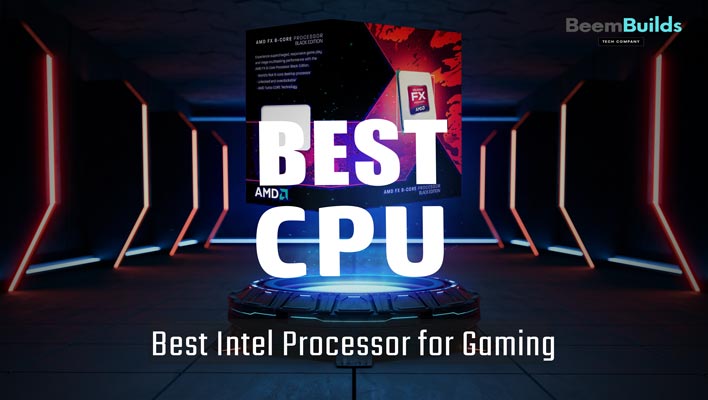If you have a high-end gaming processor, you will be able to guarantee its performance to its full capacity, and the components you have purchased with a significant amount will surely meet your gaming needs. The investment is no doubt yours for any innovative work, streaming, or rescripting you desire to do on your lovely PC, it means you don’t need an appliance to watch a stream. It is now easier than ever before to play games on a computer without worrying about multitasking.
It is important to consider a few factors before choosing the best Intel processor for gaming: Should you choose an AMD or Intel processor? When will it be upgraded? You should be able to use these with your motherboard, as they are interactive. AMD’s processors on this list are designed to fit into an AM4 socket and are known to be supported by chipsets from the 300, 400, and 500 series.
It is trickier with Intel processors, as Comet Lake reveals a new LGA 1200 socket, or you can go for either a Z490 or a cheaper B460 motherboard. A 300-series chipset is built into the 9th generation CPUs so that they can be used with LGA1151 motherboards. You might not be able to use your old motherboard with your new CPU if you are upgrading completely. You can also check Best AM3+ CPUs
There is no need to buy the most powerful processor if you don’t need it; we can rank them by cores and frequency. I recommend the following processors.
Table of Contents
Our Recommendations For Best Intel Processor for Gaming
- Best Fastest Intel Processor for Gaming – Intel Core i7 10700K
- Best Flagship Intel Processor for Gaming – Intel Core i9 10900K
- Intel’s Best Processor for Gaming – Intel Core i5-10600K
- Best Mid-Price Intel Processor for Gaming – Intel Core i7 9700K
- Best Mid-Range Intel Processor for Gaming – Intel Core i9 9900K
- Best Budget-Friendly Intel Processor for Gaming – Intel Core i5 9400F
1. Intel Core i7 10700K – Best Fastest Intel Processor for Gaming
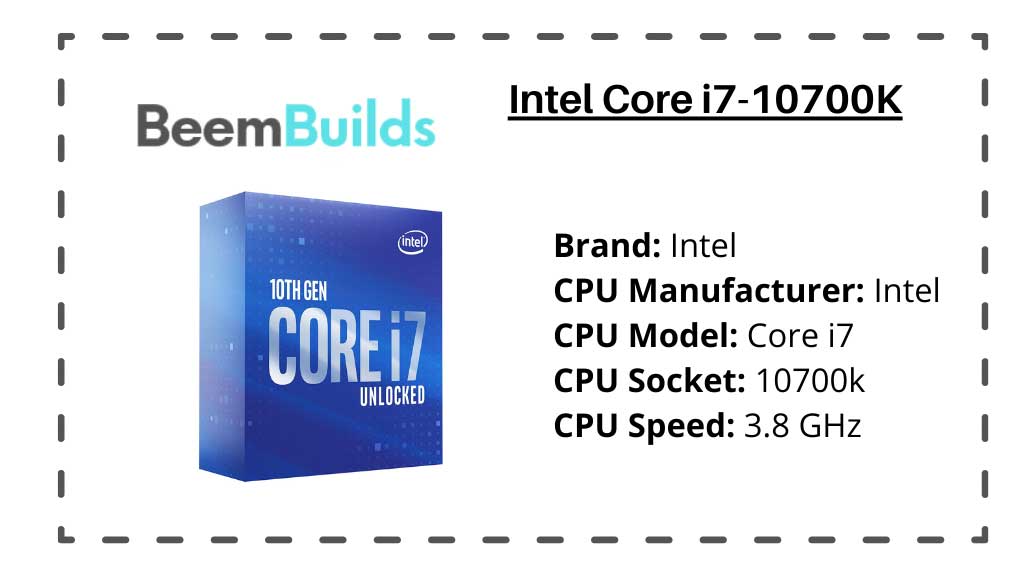 Now gamers and advanced users have a desktop processor that is optimized for them with the 10th generation Intel Core i7 10700K. This processor can be overclocked for high-end performance. As it features intel turbo boost leading technology 3.0, it can only be used with motherboards based on the 400 series chipset.
Now gamers and advanced users have a desktop processor that is optimized for them with the 10th generation Intel Core i7 10700K. This processor can be overclocked for high-end performance. As it features intel turbo boost leading technology 3.0, it can only be used with motherboards based on the 400 series chipset.
This chip was not included in the early Comet Lake testing because Intel required it to stress either the 10-core 10900k or 6-core 10600k. However, it is the best gaming chip we’ve seen so far. Having a Core i9 CPU will give you better performance, but not to the extent that it would be noticeable in-game.
In comparison with AMD’s 3700X, the 7nm Zen 2 processor delivers a significant gaming performance advantage. Similarly, product testing is closed as well; even so, the Ryzen chip will generally have some margin, but nothing noticeable.
Overclocking follows. AMD processors rarely have many high-level features. Comet Lake CPUs don’t have this one-core frequency, but the 10700K promises a single-core frequency over 5GHz and won’t melt the heatsink. Therefore, the overclocking priorities can be set in this way.
- Latest comparative data
- Maximize your boost with turbo boost 3.0
- Hyperthreading all at once
- Overclocking headroom at the high end
- Stock reaches its highest performance level
- The package does not include a cooler
- Extensions for transactional synchronization are not available
2. Intel Core i9 10900K – Best Flagship Intel Processor for Gaming
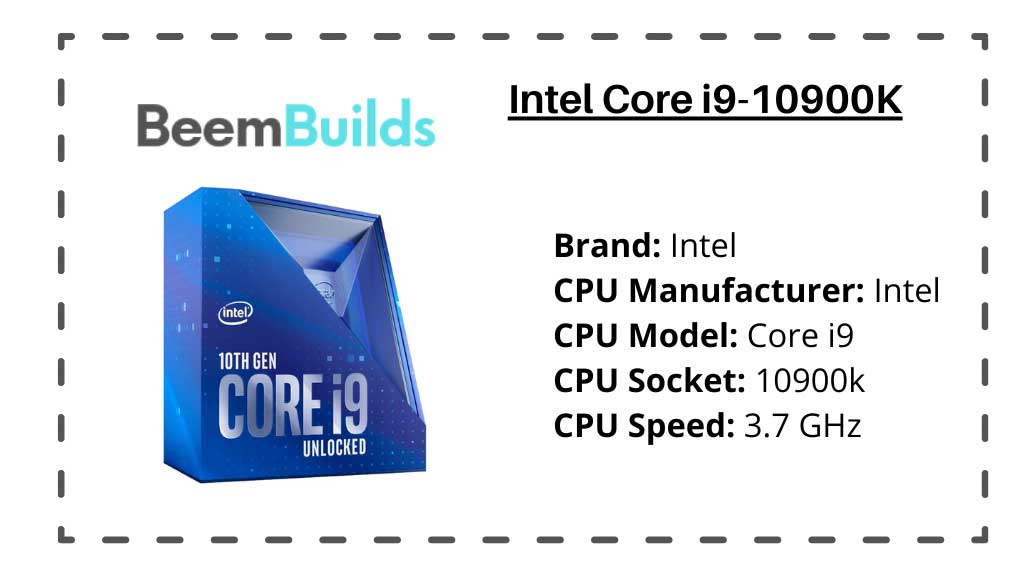 A 10TH Generation Intel Core i9 10900K desktop processor has been announced. It features Intel Turbo Boost Max Technology 3.0 for enhanced performance for smart users and gamers. You can also overclock the performance for an extra boost. It can only be used with motherboards with 400 series chipsets.
A 10TH Generation Intel Core i9 10900K desktop processor has been announced. It features Intel Turbo Boost Max Technology 3.0 for enhanced performance for smart users and gamers. You can also overclock the performance for an extra boost. It can only be used with motherboards with 400 series chipsets.
This is the best and great CPU for gaming, so get the Core i9 10900K if that is what you are looking for. Apart from maybe the world’s fastest gaming processor at the very top end, it’s almost the complete package in the majority of cases. It may not be your chip back if you put a device around it, but you won’t own it back if you don’t use it.
The Core i9-10900K is Intel’s first processor to feature ten processing cores and has a maximum speed of 5.3GHz; it is a remarkable performance for the 14nm technology Intel has been using for a long time. As a result of high clock speeds, Intel remains a top choice for gamers.
In order to go further with this chip, you will need a Z490 motherboard and a higher cooling system. If you are going to explore overclocking specs, don’t be fooled by the 95W TDP.
- Provides support for advanced gaming
- Using overclocking to its fullest potential
- The chipset has been upgraded to provide better networking
- Multi-threaded and single-threaded applications
- GPUs have a greater impact on frame rates
- Thermal output and cooling requirements are needed
3. Intel Core i5-10600K – Intel’s Best Processor for Gaming
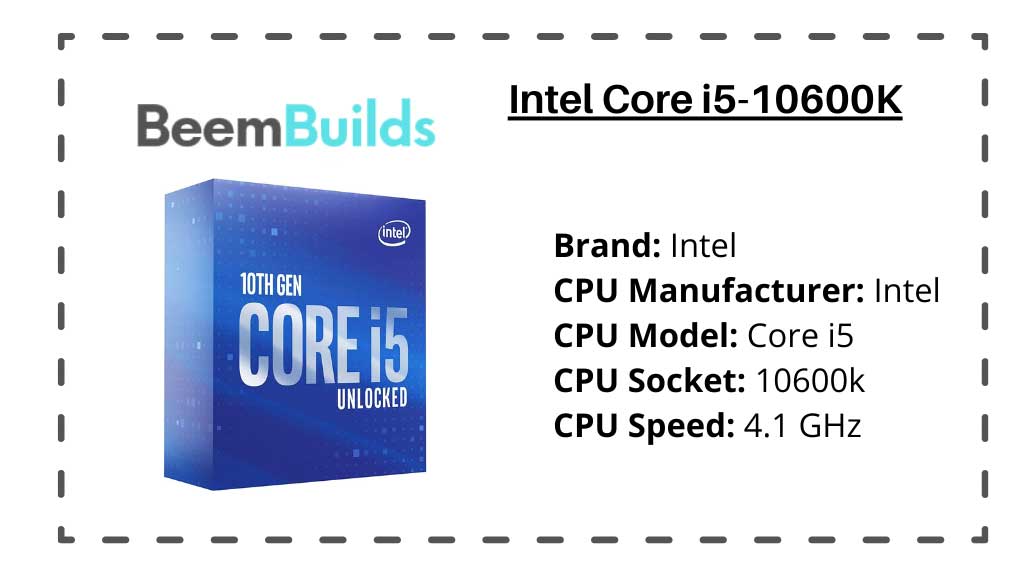 Intel’s 10th-generation Core i5-10600K is designed for productivity, gaming, overclocking, and overclocking. 400 series chipset-based motherboards are the only motherboards that support it.
Intel’s 10th-generation Core i5-10600K is designed for productivity, gaming, overclocking, and overclocking. 400 series chipset-based motherboards are the only motherboards that support it.
The Intel Core i5-10600K has six cores and twelve threads, which isn’t the world’s fastest gaming processor, but it will likely be a better CPU for most users than the Core i9 10900K. These uncertain times will certainly not bring any unwanted shocks.
Thread count and core count are key specs for i5-10600K. Since AMD’s acceptance, the i5 core has seen a boom in the number of cores in conventional processors. You must choose the best Intel processor if you want the best performance when gaming. This is the best i5-10600 processor among them all. Taking a step into the gaming world is quite impressive, since it is comparable in price to a Core i9 that.
i5-10600K can even beat outgoing fastest gaming CPUs, which was an incredible achievement for an i5 processor. There is no comparison between this chip and its Comet Lake brethren, a gaming chip that can outperform anything AMD can throw at it. Having used them as a PC gamer on a budget in the past, I recommend them.
- Featuring six cores
- Overclocking support
- Enhance gaming performance
- Exceptional thermal performance
- Performs well on multiple cores
- The package does not include a CPU cooler.
4. Intel Core i7 9700K – Best Mid-Price Intel Processor for Gaming
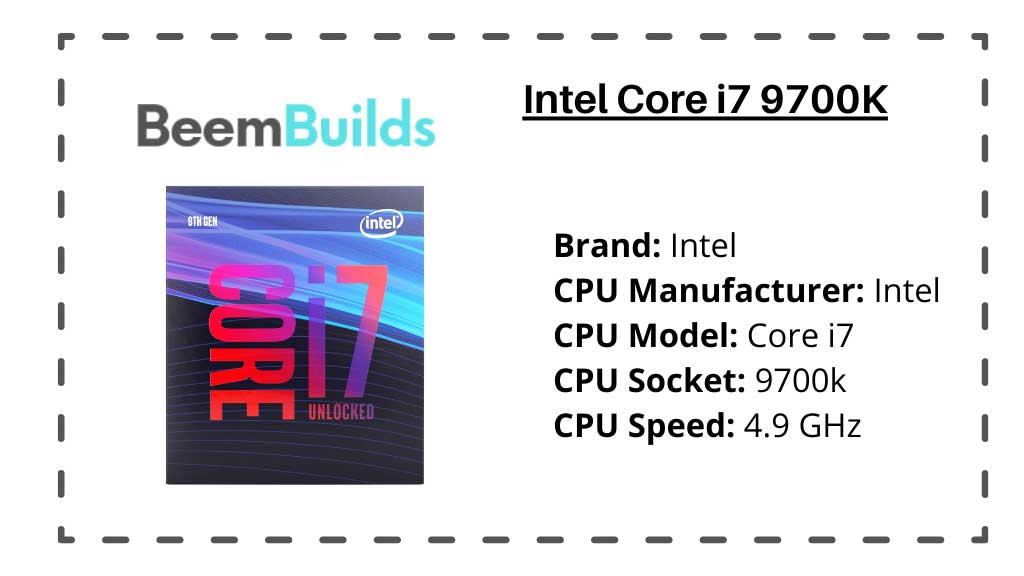 Intel’s Core i7 9700K is frequently ranked among the best CPUs as a quality messenger for high-end, high-performance computers. Nonetheless, it falls somewhere between the Core i9 and I5 lines. Nevertheless, it has a few advantages over the powerful i9-9900K. It has a low power consumption, which means it does not get too hot.
Intel’s Core i7 9700K is frequently ranked among the best CPUs as a quality messenger for high-end, high-performance computers. Nonetheless, it falls somewhere between the Core i9 and I5 lines. Nevertheless, it has a few advantages over the powerful i9-9900K. It has a low power consumption, which means it does not get too hot.
The Core i7 9700K is approximately a step behind the Core i9 9900K when it comes to gaming performance. Several games run fine on the 9900K. Even though the 9700K is one percent slower than the 9900K, it declares a few wins, and since the 9700K has a narrow error margin, gamers needn’t worry about performance.
Comparing the performance of a GTX 1080Ti with that of other CPUs, it has some limitations. The difference between the fastest Ryzen APU and a more simple solution is only about 20 percent when we drop the Ryzen APUs.
Moving up to 1440p will reduce the gap by less than 10%. The faster CPUs are only relevant for multi-GPU users, and even then, both the 9700K and 9900K should perform similarly.
The Core i9 9700K is also about 10% faster than the Core i7 2700X, and about a few steps faster than the Core i7 8700K. I would still recommend the Intel CPU if you are building a PC primarily for gaming.
- Overclocking support
- Power consumption is low
- Intel Graphics Integrated
- No Hyper-Threading, but high boost
- It does not come with a cooler
- Comparatively expensive to other options
5. Intel Core i9 9900K – Best Mid-Range Intel Processor for Gaming
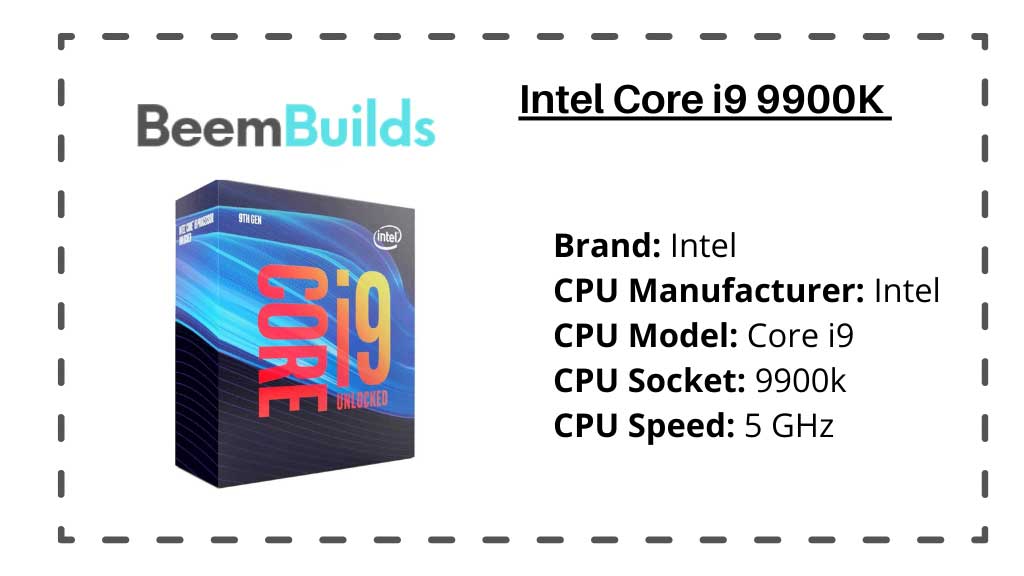 There has been a CPU war between AMD and Intel for decades. For many years, Intel has held the crown for the best consumer processor, and it had a noticeable performance advantage that came with a price on its processors, chipsets, and motherboards.
There has been a CPU war between AMD and Intel for decades. For many years, Intel has held the crown for the best consumer processor, and it had a noticeable performance advantage that came with a price on its processors, chipsets, and motherboards.
A PC gamer, without a doubt. To begin with, let’s look at gaming performance.Intel has consistently been a top performer in the gaming area. Intel’s new Core i9 9900K perseveres in the trend and even expands a bit when it is up against AMD’s new Ryzen processors. If you have a GTX 1080 Ti or faster graphics card, then you must run games at 1440p or 4K, at which point there is no significant difference between CPUs. Despite this, the Core i9-9900K is theoretically 5 percent faster than the Core i7-8700K and 15 percent faster than the Ryzen 2700X when it comes to gaming.
The results of individual games are mixed; about half have some small differences in performance. Shadow of War, Tomb Raider, Ashes of the Singularity, and Deus Ex Mankind Divided are all within 3% of the 8700K.
A Core i5-8400 still performs within 10 percent of an i9-9900K in standard gaming. Then working settings will likely focus on the differences between CPUs. You will get better gaming performance if you have a 6-core AMD or Intel processor.
- 16 threads and 8 cores
- CPU consuming the most
- A maximum of 128GB of memory is supported
- Performance per core is excellent
- There are limitations to overclocking
- Consumption of high power
6. Intel Core i5 9400F – Best Budget-Friendly Intel Processor for Gaming
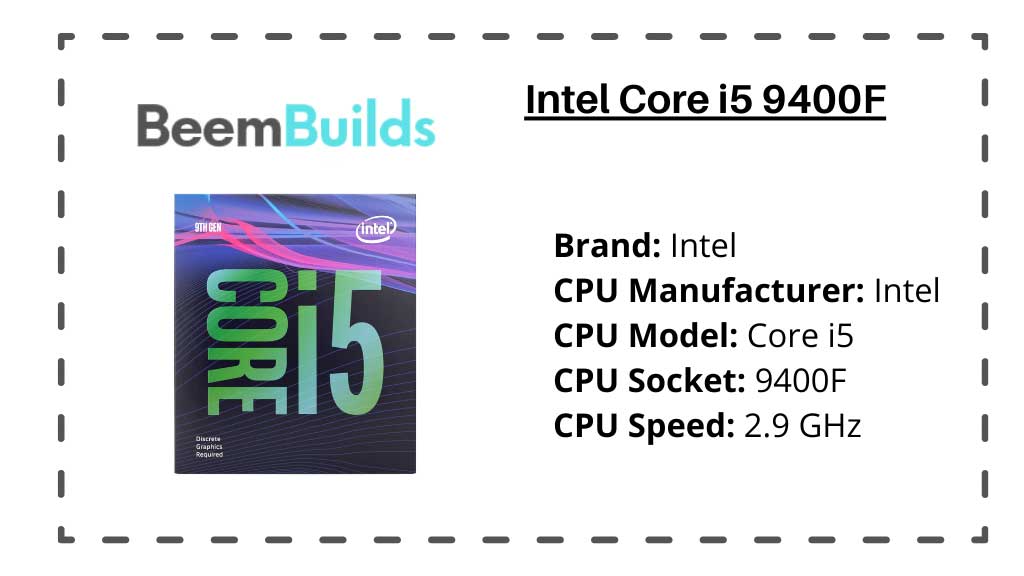 For Intel customers who are looking for a budget-friendly processor, the Core i5 9400F is a great choice. It offers slightly better performance than the previous-generation Core i5-8400, but does away with integrated graphics entirely. Quick Sync is a serious problem if you want it. It is definitely better to use NVENC on Turing. A Core i3 part with this chip costs a little more, but it’s still a pocket-friendly choice.
For Intel customers who are looking for a budget-friendly processor, the Core i5 9400F is a great choice. It offers slightly better performance than the previous-generation Core i5-8400, but does away with integrated graphics entirely. Quick Sync is a serious problem if you want it. It is definitely better to use NVENC on Turing. A Core i3 part with this chip costs a little more, but it’s still a pocket-friendly choice.
However, there are some other terms you must accept, such as no overclocking and a locked multiplier. H370 motherboards are available, though.Also included in the box is a CPU cooler, which is a must-have for all CPUs. In most cases, you don’t have to worry about a lower base clock if you use a motherboard that supports 9400KF at 3.9GHz.
Despite its slower performance in multi-threaded tests, the i5-9400F tied AMD’s 3900X in our gaming zone. Games may start leaving behind the i5-9400F’s 6-core capacity in the future, but you should be ready for an upgrade before that point. A much faster and more affordable option is the i5-9400F.
- Easy-to-manage TDP
- Budget-friendly price range.
- The package includes a cooler
- Performance on a single core is excellent
- Graphics chip missing
- Overclocking is not supported
DISCUSSIONS RELATED TO THE SUBJECT
The caching process
There is a small amount of high-speed memory associated with this concept that is used to store and execute frequently used commands and orders in order to speed up software implementation. L1 is the smallest and fastest of the three CPU levels, whereas L3 is the largest and slowlyest.
Core
In supercomputers, processors can have as many as 70 cores, but for most purchaser machines, CPUs have between four and eight cores. AMD’s latest CPUs can have up to 16 cores.
Speed of the clock
CPU speed is measured in hertz, which is the speed at which instructions can be implemented. 3.7 GHz processors can process 3.7 billion commands per second. A game’s clock speed is one of the most important metrics for measuring performance in games and workload activity.
The heat sink
In active cooling, a heat sink uses fans or liquid cooling (passive cooling) to maintain a component’s temperature.
STM (Hyper-Threading)
Two sets of instructions can be managed simultaneously by a processor using Intel’s tech language. SMT is referred to as simultaneous multi-threading by AMD and other CPU vendors.
PGA (Pin Grid Array), and BGA (Ball Grid Array) are the three types of sockets.
Sockets on motherboards are used to communicate with CPUs. In addition to the pins, the LGA socket is used by Intel. In AMD’s AM4 solution, PGA, the processor pins are attached to the socket holes. LGA sockets are also used on Threadripper CPUs. A BGA socket permanently connects the processor to the motherboard, as on a laptop.
Thermodynamic Design Power (TDP)
A set up or chip is designed to produce the maximum amount of heat that an assistant cooling system can handle under work pressure. On a large scale, it indicates the amount of power a component consumes, or on a smaller scale, it refers to the full PC, the CPU, the GPU, and any other performance elements that produce heat.
Thread
Specifically, a thread represents a set of commands for a program. For example, the cache can be utilized by two threads per core simultaneously on Intel and AMD processors that do not have SMT.
Boosting turbo
Intel’s processors can handle demanding workloads at higher clock speeds. Boost and turbo clocks are also supported by AMD, and we use the CPU vendors’ factors that can be replaced.
For gaming PCs, what are the best processors to choose?
Whenever you realize that you need new features on your current desktop because your Intel processor is outdated, you are often bombarded with technical jargon.
When it comes to choosing an Intel CPU, the details like Quad-cores, Hyper-Threading, Turbo-Boosting, and Cache size are important. Choosing a processor should take these factors into account.
A quick glance at your current Intel CPU will give you an overview of where your PC currently stands in terms of power and performance. To access the system tab of your control panel, click on “System and Security” under the Control Panel heading.
Here you will find information about your computer’s CPU, operating system, and RAM. Your current Intel CPU will be listed under the processor section. Intel Core i7 processors are faster than Intel Core i5, while Intel Core i5 is faster than Intel Core i3.
They can only do the best they can, but that’s not enough for heavy workloads or gaming. As an alternative, you can get by with a core i7 for a reasonable price. In addition to checking e-mail and browsing the web, laptops can also be used for other primary tasks.
The higher clock speeds of Intel’s core i7 processors tend to increase their core count, too. The Intel i7 is probably worth the extra flair if you wish to run graphically intensive games and apps. You should opt for a Core i5 with a high clock speed instead of a Core i7 processor with additional cores if your needs are more basic.
Finally, if you prefer Intel’s high-performance Core i9 processors, if you want the best Intel can build then go for that. Their performance payloads may not be cheap, but they are generally more than adequate for most users.
To find out whether your processor is compatible, what is the best way to go about it?
You will save money if you upgrade only the CPU chips and not the rest of the computer equipment. For checking the progress of your CPU, we have four sections for potential incompatibilities based on your motherboard specs.
1- Manufacturing compatibility
Intel and Advanced Micro Devices manufacture desktop processor chips as of January 2013. The two chips offer users with typical businesses no significant differences: their CPUs come in a wide range of speeds and capabilities.
They are both compatible with similar operating systems. Since these chips are completely incompatible from a hardware standpoint, they need different motherboards.
2- Compatibility with physical sockets
It is possible for different processors in the same company to use different physical sockets. You cannot use the latest model Core i7 chip with an LGA2011 socket if your motherboard has an Intel LGA 1366 socket. A 1366-pin socket cannot accommodate a 2011-pin chip in a material manner. There are AMD sockets that are compatible with multiple chips, and there are AMD sockets that are not.
3- Compatibility with memory
There are various types of memory needed for different processors, as we all know. Memory used by older computers typically uses Double Data Rate 2, whereas memory used by modern computers typically uses Double Data Rate 3. On a motherboard, CPUs are generally designed to support either one type of memory or the other simultaneously, or they cannot be combined unless they have different sockets. Even within a single group, RAM modules become faster as time passes, so an older one may not work with the latest CPU.
4- Compatibility with chip sets
You may not be able to use an earlier motherboard with a CPU that can overcome the previous three difficulties. The motherboard, and the chipset that controls it, need to increase their speed as well. Because of the inability to transfer data between the CPU processor and the memory or the graphics card, a new CPU cannot take advantage of its extra speed.
Conclusion
We have reached the end of the list, and here are some final thoughts about the best Intel processor for gaming. You might have to give up some features in the Intel core i7-9700K if you prefer a budget-friendly product. For best gaming performance, go for the i9-10900K if you have a large budget. Intel’s overall quality and performance are not compromised in any of these products. The available choices and compatibility allow you to select the processor that suits your needs based on a variety of factors, like your budget.
Frequently Asked Questions
Can I play games on an i5?
These Intel Core i5 processors are designed for those who need performance, graphics, and speed. Intel’s Core i5 1060 performs well in a variety of tasks, even in heavy-duty games. However, Intel’s Core i7 is a better option for gamers and enthusiasts. Now that you’ve seen both options, it’s up to you whether to choose i5 or i7.
Does Intel still have the best gaming capabilities?
To this question, the answer is definitely YES. Intel’s most expensive desktop processor, the Intel Core i5 10600K, is not far behind in gaming performance with the Intel Core i5 10600K. Midrange manufacturers will most likely release products with lower GPUs, which will help to keep CPU performance in check.
Is there a good gaming processor?
I5 is the answer. Definitely one of the best graphics cards for gaming. However, the Intel Core i7 9700k or Ryzen 5 will suffice with all before one. You are generally going to need a high-class chip, such as the Intel 9th gen Core i9s, for a high-end system or if you perform an exceptional amount of extra-demanding tasks.
What will be the best gaming processor in 2024?
Choosing the best gaming CPU means balancing performance and specs with your PC budget. This article has discussed several options that can help you select the best processor based on your priorities. Gaming CPUs are currently dominated by Intel’s Core i9 9900K. Likewise, the Intel Core i9 10900K is the best gaming CPU on Comet Lake and is overclockable to the highest level.
